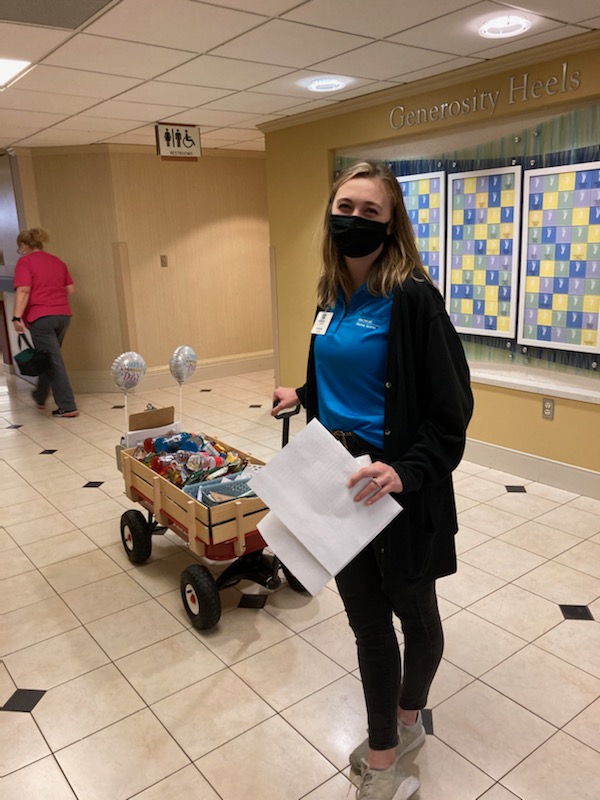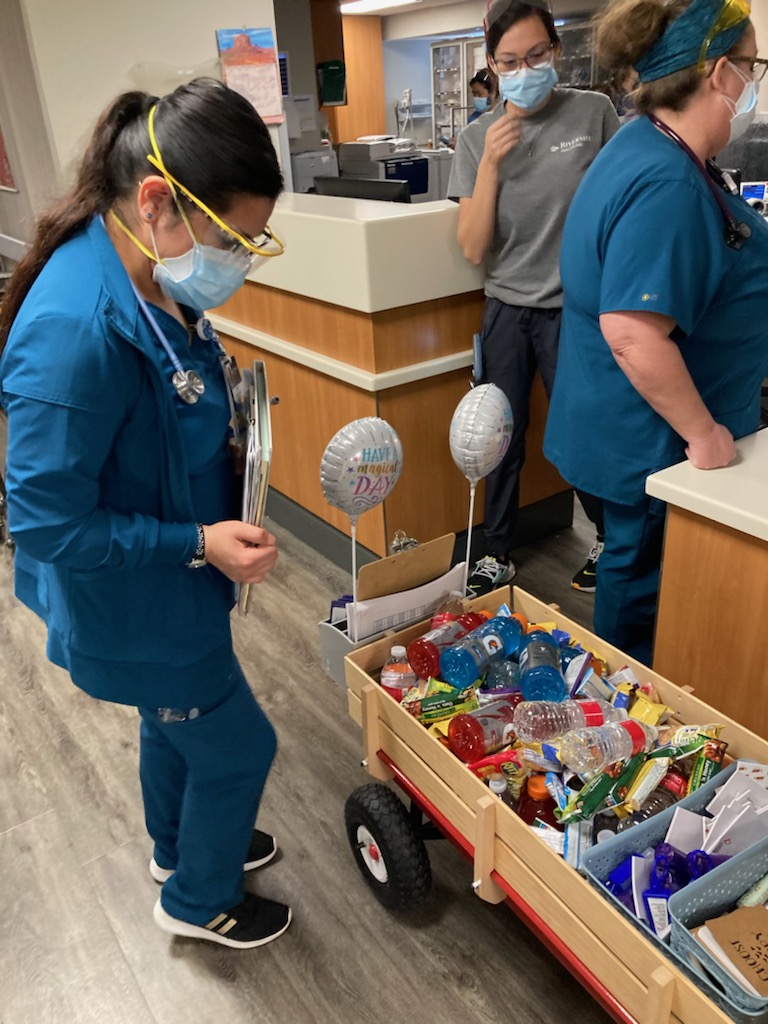Well In Mind
Inaugural Wellness Wagon Day

The Riverside Wellness Wagon Visited the 3rd floor tower on Thursday November 12, 2020. Be watching for the wagon to visit your department. Filled items to show appreciation to our staff, the Wellness Wagon will be rounding daily.

Riverside values our employees and the exceptional care they continue to provide our patients during this trying time.
Well in Mind: Combat Seasonal Affective Disorder
Seasonal Affective Disorder (SAD) is a type of depression that’s related to changes in seasons —most often starting in the fall and continuing into the winter months. The pandemic we are going through may add to the misery of Seasonal Affective Disorder, but we have strategies that can help! It’s important to line up resources that can be put in place now, so when your tank is already low, it doesn’t completely drop as we get into these months.
- Create and follow a schedule that designates a time for sleep, meals, exercise and self-care. This provides a welcome sense of familiarity.
- Count the hours of sunlight as a reminder that seasonal depression is just that — seasonal.
- Take up indoor activities such as growing indoor plants, reading, writing letters and painting. This can give you something to look forward to each day.
- Practice gratitude to help you feel more empowered and off-balance a sense of powerlessness that COVID has collectively provided our world.
- Get yourself some light therapy by going for a daily walk, opening blinds, turning on lights, or using a light therapy box which mimics outdoor light.
- Substitute cellphone scrolling with knitting. Colors, patterns and the tactile feel of textures is more soothing to focus on.
- Get physical activity. An easy in-home option can be yoga.
Well In Mind is here for you. Just call 815-933-2240, option #2 to schedule an appointment or to ask about your EAP benefits.
Well in Mind: 6 Coping Strategies to Combat Pandemic Fatigue
- Self-Care is not optional! Part of our professional obligation is to strive for our own well-being. Put your own oxygen mask on first! Self-care can be physical, mental, emotional, spiritual, or social. For specific ideas, try the self-care inventory: NAMI Self-Care Inventory
- Set attainable well-being goals and strive to implement your well-being plan. Those goals might include exercise, meditation, nutrition, yoga, mindfulness, prayer, gardening, connections with others, music, reading, or other forms of restoration. Find the right match for you and do it regularly.
- Take time off, if available. While in years past, we may have saved vacation days for travel or going to the beach, that may be less realistic for the foreseeable future. Enjoy experiences with your family, friends, and pets.
- Take a vacation from news and social media. The bombardment of negative and sensational headlines can be overwhelming. There is little need to know the daily tally of coronavirus infections and deaths, unless your job is dependent upon those figures. Political discord will continue whether we follow it daily or not.
- Seek diversions that are meaningful. Spend time intentionally and do things that give you meaning.
- Create predictable routines. Focus on managing the things you have control over.
Well In Mind: A Message From Our CEO & President Phil Kambic
“We want our employees to know how important we feel mental health is. Not only for ourselves, but also our coworkers and the patients and families we serve. Seeking support for mental health isn’t something that should be delayed or pushed aside. Seeking help shouldn’t be seen as a weakness. Mental health should be approached in the same way that someone would seek help for physical health. We know that 2020 has been a difficult year. Riverside wants to make a positive impact by changing the stigma surrounding mental health. Let’s remember to make our mental health a priority in our lives.”
Well In Mind Mindful Minute: One Simple Pandemic Stress Reducer
UK researchers out of the University of Sussex found that in as little as 6 minutes: reading a novel that transports you into a character’s world, you can reduce stress by 68% with lowered heart rate and muscle tension! Reading outshined listening to music, taking a walk or having a cup of your favorite warm beverage.
Book readers live an average of two years longer than non-readers, according to research published in Social Science & Medicine. Compared to those who didn’t read books, people who read for up to 3.5 hours per week had a 17% lower risk of dying over the next 12 years; and those who read more than 3.5 hours per week lowered the risk of dying prematurely by 23%.
Also, lifelong readers have been found to have more protection against Lewy bodies, amyloid burden, and tangles in their brains over a six-year study, published in Neurology. Reading into one’s older years reduced memory decline by more than 30%, compared to other forms of mental activity.
Well In Mind EAP is here for you. Call 815-933-2240 to schedule.

